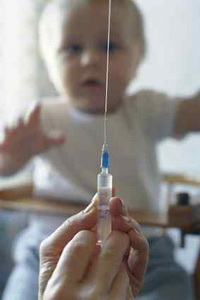U.S. Health and Human Services Secretary Promises There Will Be Enough H1N1 Vaccine
Hospitals in Nevada have the rooms to handle an excess number of patients if the H1N1 emergency worsens, officials said Monday.

"All hospitals have contingency plans for providing extra beds," said Dr. Dale Carrison, head of emergency services at University Medical Center. "But where do we get the caregivers to care for people? That's the limiting factor in this community."
President Barack Obama late Friday signed a declaration that made the H1N1 outbreak a national emergency. The declaration is a preemptive measure that gives Health and Human Services Secretary Kathleen Sebelius the power to allow hospitals to move emergency rooms off-site. The intent is to improve treatment efficiency and create separate areas for patients infected with H1N1, Las Vegas Review - Journal reports.
In the meantime, Health and Human Services Secretary Kathleen Sebelius promised that, despite delays, there would eventually be enough swine flu vaccine for all Americans. “The vaccine is coming out the door as fast as it comes off the production line,” she said. The secretary appeared on three morning television news programs to deliver the assurance. Slow growth of the vaccine in eggs and different production problems at the five companies making the vaccine mean the country will have only about 30 million doses by the end of this month, The New York Times reports.
It was also reported, despite nationwide shortfalls in the supply of swine flu vaccine, New York City’s health commissioner said on Monday that the city was going ahead with the first stage of its plan to vaccinate schoolchildren.
School nurses will begin giving free vaccinations on Wednesday at 125 small public elementary schools, all with fewer than 400 students, said the commissioner, Dr. Thomas A. Farley. “We have 40,000 doses set aside for the first wave of schools, which we feel should be adequate,” Dr. Farley said.
New York City has seen very little swine flu activity this fall, after being perhaps the worst-hit city in the nation when the virus appeared last spring, Dr. Farley said. Immunologists attribute the absence of flu activity to immunity built up in a large portion of the city’s population.
But Dr. Farley said that even New Yorkers who thought they had been infected with swine flu in the spring should get the vaccine, because absent testing, they may have actually had some other type of respiratory illness, and because “the vaccine does no harm,” The New York Times reports.
Subscribe to Pravda.Ru Telegram channel, Facebook, RSS!





